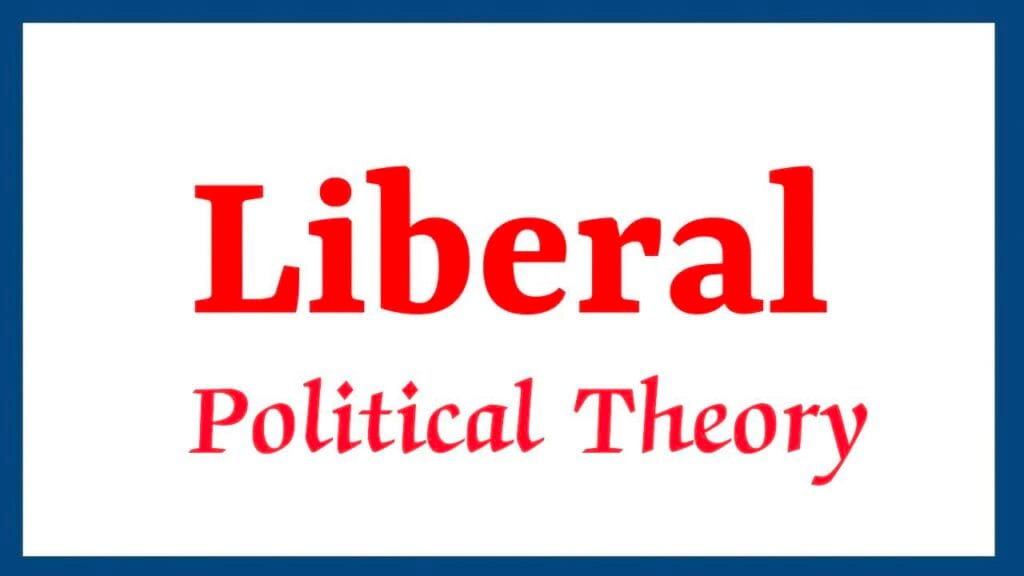
Liberal political theory is one of the most influential and long-standing traditions in political thought. It is the centered around the principles of individual liberty, equality, and democracy, and it has shaped many of the political systems and constitutions in the modern world, particularly in Western democracies.
Core Principles of Liberal Political Theory:
- Individual Freedom (Liberty):
- Liberty is the most fundamental value in liberalism. It is the belief that individuals should have the freedom to make their own choices, live their lives according to their own values, and pursue their own interests, as long as they do not harm others.
- This idea includes both negative liberty (freedom from external constraints) and positive liberty (the capacity to act upon one’s free will).
- Equality:
- Liberalism supports equality before the law, where all individuals are treated equally, regardless of their background, wealth, or status.
- There is also an emphasis on equal rights and opportunities for all, though liberals may differ on the extent to which the state should intervene to promote social and economic equality.
- Democracy and Representation:
- Democracy is a key element in liberal theory, where political power is exercised through elected representatives, and citizens have a say in the government through free and fair elections.
- Liberalism supports political systems where governments are accountable to the people and where political participation is encouraged.
- Rule of Law:
- Liberal theory emphasizes the rule of law, meaning that laws should be applied equally to all individuals, including those in power.
- No one is above the law, and laws should protect the rights and liberties of individuals.
- Pluralism and Tolerance:
- Liberalism advocates for a pluralistic society where different beliefs, values, and lifestyles can coexist peacefully. This includes religious, cultural, and ideological diversity.
- Tolerance of different viewpoints and ways of life is a cornerstone of liberal political thought.
- Limited Government:
- Liberalism supports the idea of a limited government that does not infringe on individual freedoms. The government should play a role in protecting individual rights but should avoid unnecessary interference in people’s private lives.
- This is often expressed through checks and balances, separation of powers, and constitutional limits on the government’s authority.
- Rights:
- Liberal political theory places a strong emphasis on individual rights (e.g., freedom of speech, freedom of religion, property rights).
- These rights are seen as universal and inalienable, meaning they apply to all people and cannot be taken away by the government or any other entity.
Historical Development:
Liberalism emerged in the 17th and 18th centuries, influenced by the Enlightenment and key political developments like the English, American, and French revolutions. Major philosophers of liberalism include:
- John Locke (1632–1704): Often called the “father of liberalism,” Locke argued that individuals have natural rights to life, liberty, and property, and that governments are formed through a social contract to protect these rights. He emphasized the importance of limited government and the consent of the governed.
- Jean-Jacques Rousseau (1712–1778): Though more radical, Rousseau’s work influenced liberal ideas about democracy, popular sovereignty, and the general will.
- John Stuart Mill (1806–1873): A key figure in modern liberalism, Mill developed the idea of utilitarianism (the greatest good for the greatest number) and argued for both individual freedom and the protection of minority rights. His famous work, On Liberty, stresses the importance of free speech and individual autonomy.
- Immanuel Kant (1724–1804): Kant argued that people should be treated as ends in themselves and not merely as means to an end, contributing to liberal ideas of individual dignity and respect for personal rights.
Varieties of Liberalism:
Over time, liberal political theory has evolved and branched into different schools of thought:
- Classical Liberalism:
- Focuses on minimal government intervention in the economy and society.
- Advocates for free markets, private property, and individual autonomy.
- Major proponents include John Locke, Adam Smith, and Friedrich Hayek.
- Modern (or Social) Liberalism:
- Supports a more active role for the state in ensuring social justice and equal opportunities.
- Argues that the government should intervene to reduce inequality and provide public goods like education and healthcare.
- Key thinkers include John Stuart Mill and John Maynard Keynes.
- Neoliberalism:
- A 20th-century revival of classical liberal ideas that emphasizes free markets, deregulation, and privatization as the best means to achieve economic growth and individual liberty.
- It became influential in the late 20th century, particularly with the policies of leaders like Ronald Reagan in the U.S. and Margaret Thatcher in the U.K.
- Libertarianism:
- An extreme form of classical liberalism that advocates for the smallest possible government, emphasizing individual liberty above all else.
- Libertarians believe in minimal regulation and taxation, arguing that free markets and personal choice should dominate.
Criticisms of Liberalism:
Despite its widespread influence, liberalism has faced several critiques:
- Marxist and socialist critiques argue that liberalism upholds a capitalist system that perpetuates economic inequality and class domination.
- Communitarian critiques claim that liberalism’s focus on individualism neglects the importance of community, culture, and social bonds.
- Conservative critiques argue that liberalism can lead to moral relativism and the breakdown of traditional values and social order.
- Post-colonial critiques assert that liberalism’s ideals of freedom and equality have often been hypocritical, especially in the context of European imperialism and colonialism.
Conclusion:
Liberal political theory is built on the protection of individual rights and liberties, democratic governance, and limited government. It continues to evolve, with debates over the role of the state, the balance between freedom and equality, and the challenges of pluralism and diversity in modern societies.

